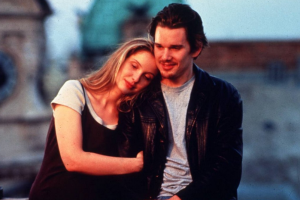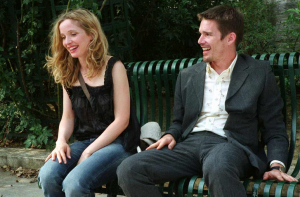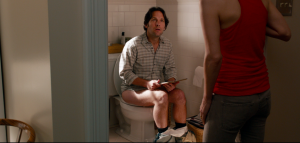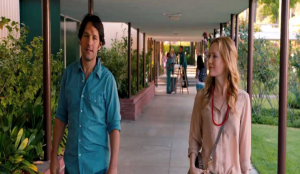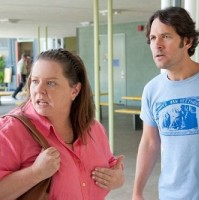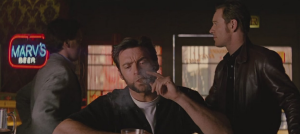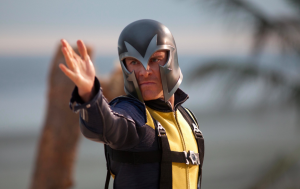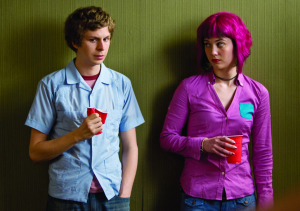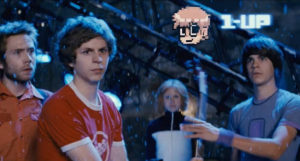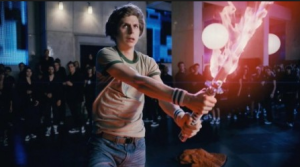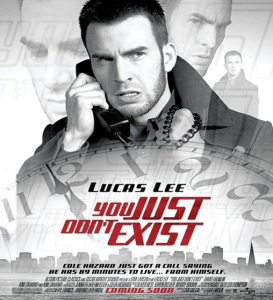The 40 Year-Old-Critic: Before Midnight (2013)
In The 40-Year-Old Critic, Venganza Media creator and host Arnie Carvalho recalls a memorable film for each year of his life. This series appears daily on the Venganza Media Gazette.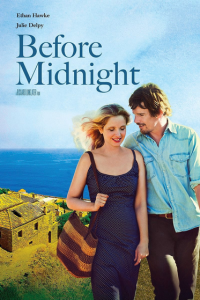
I described yesterday my fear of watching This Is 40 — fear of a movie that may make me examine my own life in uncomfortable ways. I never expected the film I really should have been nervous of was one I raced to opening weekend; Richard Linklater’s Before Midnight, the third film in his Before series.
I first saw Before Sunrise in the mid-90s. I had discovered indie director Linklater with his mainstream 1993 hit Dazed and Confused. I considered that film to be the American Graffiti for Generation X. Both films were period pieces that spoke as much to the trials of teens in the present day as they did in the times in which they were set. Both films also focused on the period rock to help advance the story and the mood. After Dazed, Linklater became a director I wanted to follow.
More than just the director, I was also drawn to Sunrise by its male lead, Ethan Hawke, an actor I enjoyed seeing in Dead Poets Society and, more recently at the time of Sunrise‘s release, Reality Bites.
Finally, the genre seemed up my alley — the romantic comedy. From the trailers Sunrise seemed like another Reality Bites or Singles — Jesse (Hawke) was an American 20-something traveling through Europe. On a train ride he meets Céline (Julie Delpy), a blonde French beauty. The two have one night together in Vienna before Jesse returns to the United States.
When I saw the film I was surprised that it was far more of a romance film than a comedy, but also a tender and moving one. Few films made me feel I was watching an honest romance. Hawke and Delpy sold their attraction and affection for each other. Though they had only one night together, the two had laughs, arguments, and an honest connection. They fell in love with each other, and I fell in love with their relationship.
It was a great film, but not one I ever expected to have a sequel. It simply wasn’t the genre of film that spawned sequels. I would revisit Before Sunrise regularly in the 90s but never expected to see the characters again. I knew that Delpy, Hawke, and Linklater always teased the thought of returning to Jesse and Céline, but I just didn’t believe it would happen. As such I was utterly stunned in 2003 when I read the trio was reteaming for Before Sunset. This time the film was written by Linklater as well as Hawke and Delphy — the actors were helping shape the story of their characters. That was a major change from the original and showed that the director and stars were creating something truly unique and special.
Before Sunset told of Jesse and Céline meeting up again for the first time in 9 years. I was excited to see the film; I felt like Linklater was giving me a mini-college reunion — my own chance to catch up with two people I fondly remembered from the 90s.
When the film came out in limited release I was concerned it wouldn’t open in Springfield. As such Marjorie and I drove 8 hours round trip to see the movie in Chicago; it meant that much to me (ironically it opened in our town about two months later). I really enjoyed the sequel, though it had a totally different vibe than the original. Now in their 30s, the two have followed different paths; Jesse is married with a son, adding a complication and moral complexity to the prospect of a rekindled romance. Like most reunions, it was good to see these friends again, but we had grown apart a bit, and I didn’t feel as strongly about them as I did in the 90s.
But the door had been opened, and when Before Sunset came out Linklater, Delpy, and Hawke said they may return to these characters every nine years and check in on them. I wouldn’t have been shocked if a third film never came, but I equally wasn’t surprised when the third film, Before Midnight, was announced.
Now it was time for the cinematic equivalent of my 20th college reunion — it was time to see Céline and Jesse again. I was a bit concerned. Trailers let me know that the two characters had been together for the past nine years. While Linklater was a director I trusted, it seemed like a totally different concept than the previous two films. It felt like we had captured the characters’ every moment together on film, but in the years between Before Sunset and Before Midnight Jesse had left his wife and moved to Europe to be with Céline; they were now married and had twin girls. Could the film carry the same emotional resonance now that we were getting a “day in the life” type of story instead of seeing their only encounter?
My concerns were secondary, though; I saw Linklater, Hawke, and Delpy again teamed to find these characters’ stories, and so Before Midnight was my only must-see film in 2013 that wasn’t reviewed for Now Playing Podcast (though we came really close; I championed it, Stuart also wanted to, but it didn’t fit the schedule). This time there was no question Before Midnight would play in Springfield, and Marjorie and I went opening weekend. I sat down and watched the best film I would see all year.
Before Midnight never feels rushed. Though Linklater needs to catch us up on the nine years of history between our characters, the movie starts with a long scene of Jesse and Hank, his son from his previous marriage. After spending time with Céline and Jesse in Greece he was returning home to his mother. Jesse’s desire to be a good father is at odds with his current marriage — he’d like to move back to the states and be closer to his son.
When we again meet Céline and their twin daughters Ella and Nina we see a happy family, at least on the surface. With Jesse back, the four are taking a road trip for a weekend vacation at a house in the country. On the way the strains start to show as Céline starts discussing her dislike for her career and desire to change jobs though it would greatly impact their family.
But once we reach the country house and are introduced to Jesse and Céline’s various friends the theme of this movie became clear: it’s an exploration of ideas about love, sex, and commitment. Long conversations are had with middle-aged Céline and Jesse seeing new passion kindled between a twenty-something couple, and an older couple discussing their many years together. These stories tell of love at different stages, but also provide interesting debate on what it means to be in love, and to be committed. Céline and Jesse are committed it seems, and in love we hope, but they now want different things in their lives. In the grand spectrum of life, where does love fall on the priority list? What compromises must be made in order to work the logistics of staying together both emotionally and geographically?
As with the film’s view of love, the movie also changes as time passes. Céline and Jesse are given a romantic night at a hotel; their hosts will watch the girls. Now the film is back on familiar footing, with Jesse and Céline visiting a European locale and having meaningful conversations. Yet the stage has been set, and this time they must address their lives and their next steps.
It doesn’t go well. As couples do, new arguments lead to the trudging up of old dirt; Jesse had an affair while on a book tour, but it was just sex, not love. Meanwhile it’s strongly suggested Céline also cheated, rekindling an old romance. The fight grows bitter, raw, and real. It ends with Julie leaving the hotel room and her husband, saying she doesn’t love him anymore.
The film is dark and brooding. This was the film that I had feared This Is 40 would be; a hard look at middle-age and differing views of marriage and love. More, it is well-balanced. Both characters have made selfish choices and transgressions. Neither character is fully right, nor fully wrong, and, as accusations are made in the midst of a bitter fight, it’s hard to tell even what is fact and what is unsubstantiated accusation. It’s likely due to both lead actors participating in the script that this delicate balance is achieved. Neither character is the “bad guy” — nor is either good. Both are operating from their own points of view, and now they’re realizing their viewpoints don’t match up as they once thought.
This film hit incredibly close to home. Marjorie and I had been together for 13 years, married 11. Those years have been full of happiness, but all lives have hardships and all couples have spats. Watching Jesse and Céline break down in Europe when they realize they each had different ideas of marriage made me reflect. First, Marjorie and I were planning a romantic European vacation just weeks after watching this film — Before Midnight certainly seemed like a cautionary tale to not pick that time to discuss major life-changing decisions.
Marjorie found herself identifying with Céline; not just for the gender but also because Marjorie had a job and employer that made her miserable. Like Céline, Marjorie was looking for a career change, and that type of major decision can have a ripple effect. It did so happen that she interviewed for a new job the day before we flew to Europe, and while it didn’t diminish the fun of our vacation one iota, the question of career choices was discussed often on the trip.
I found myself identifying with Jesse. Sure, he’d made some poor decisions, but he was trying to balance his career with his desire to be a good husband and father. While I have no children, I completely identified with his being pulled in multiple directions. I also saw in Jesse my own artistic nature, but one not as accomplished as I’d like due to compromises and other priorities. I completely felt what Jesse was going through and empathized with him.
Yet what the movie really exposes is that two people can be together and have totally different views of their relationship. While happy and playful on the surface, beneath there could be unknown angst and tension. And it’s not that both parties are sublimating — it’s completely possible one person is miserable while the other is content.
The film led to some great conversations with my wife, ensuring we were indeed on the same page with our lives and not a tangled mess of miscommunication like Jesse and Céline. It was very interesting leaving the theater and cautiously discussing the themes; especially when we each took different sides in the argument. It didn’t, but it could have easily led to an argument between us, and that is how real Before Midnight feels.
In private I continued to ruminate on this film and the ideas it put forth. What is love? How does it change over time? These aren’t just academic discussions; these are the emotions that rule our lives. I love that Linklater, Hawke, and Delpy don’t give definitive answers; they raise viewpoints and it’s up to each individual member of the audience to supply the answers that are true for them.
This film is not the tearing down of what Before Sunrise and Before Sunset — its end message seems to indicate love conquers all, and it seems Céline and Jesse are in love after all.
As am I with my wife. As I write this we are on another romantic getaway for my 40th birthday. And, no, there have not been any fights, no storming out, no near-divorce moments.
But Before Midnight is one of the greatest types of films, one that hits home emotionally. I don’t know if Linklater, Delpy, and Hawke will reteam again in 2022. If they do, I don’t know if Célene and Jesse will still be married, or a divorced couple meeting again. What I know is I’ll be there to see what these characters say about people in the next stage of their lives, and I wonder how it will mirror my own.
Arnie is a movie critic for Now Playing Podcast, a book reviewer for the Books & Nachos podcast, and co-host of the collecting podcasts Star Wars Action News and Marvelicious Toys. You can follow him on Twitter @thearniec
September 12, 2014 Posted by Arnie C | 40-Year-Old Critic, Movies, Reviews | 2010s, Before Midnight, Before Sunrise, Before Sunset, Enertainment, Ethan Hawke, Film, Julie Delpy, Movie, Movies, Now Playing, Now Playing Podcast, Podcasts, Review, Reviews, Richard Linklater | 2 Comments
The 40 Year-Old-Critic: This Is 40 (2012)
In The 40-Year-Old Critic, Venganza Media creator and host Arnie Carvalho recalls a memorable film for each year of his life. This series appears daily on the Venganza Media Gazette.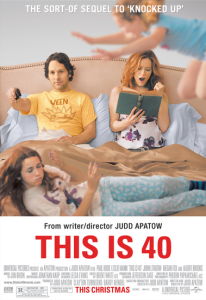
Have you ever wanted to see a movie and yet been afraid to watch it?
It’s an interesting feeling — the allure of a film that should be very good and entertaining, but the anticipation is tainted by fear that I may have an uncomfortable experience. Not that I feel the movie may be bad, but that it could be so good that it makes you a different person after watching it.
As a child I held this fear about many horror movies. From A Nightmare on Elm Street to Hellraiser II, I was scared of what the movie might contain. But as I grew up it wasn’t horror movies that scared me; it was stories about people, and movies that may hold up a mirror and force me to look deep inside myself.
In 2012 the film I feared watching most was This Is 40.
On the surface that may seem absolutely silly. After all, what is there to fear about a comedy, especially a spin off to the easy, breezy stoner sex romp Knocked Up?
The problem lies entirely in coincidence. This is 40 was released in the holiday season of 2012, a time in which those numbers — 4 – 0 — loomed large in my future. This entire review series is a retrospective of my 40 years of watching films, but it ends with me being forced to say, “So… this is 40.”
More, this movie was written and directed by Judd Apatow, best known for his 2005 comedy, The 40-Year-Old Virgin. Though I had watched a few episodes of his TV series Freaks and Geeks, it was through Virgin that I became aware of Apatow’s work.
Clearly he was a funny writer; The 40-Year-Old Virgin had me laughing out loud throughout. But despite being funny and raunchy, there was something about the film that felt real and true. Andy, the sexually-challenged obsessive toy collector played by Steve Carrell, may have been a caricature, but he was also sweet and earnest. By the end of the film he’d gone from wanting sex to wanting true love, and the audience rooted for him. More, his friends all seemed to have more realistic problems; one constantly cheats on his girlfriend, another is obsessed with his ex.
This combination of heart and humor became Apatow’s trademark, and while I didn’t feel his follow-up films Knocked Up and Funny People reached the heights of The 40-Year-Old Virgin, they both were films with a human story surrounded by comedy. Even the films Apatow produced, but didn’t direct or write, often followed that pattern, with Superbad, Forgetting Sarah Marshall, Wanderlust, and The Five-Year Engagement all being character studies as well as comedies.
It was specifically Funny People that made me fear This is 40 the most. That film featured Adam Sandler as a comedian dying of leukemia. While the movie pulled several punches and most of the jokes didn’t hit (like any 21st Century Sandler film), it showed a dramatic weight and had several moments that tugged at the heartstrings and made me contemplate my own death — what would I do if I became terminally ill at a still relatively young age?
Now Apatow was going to set his sights squarely on middle-aged suburbanites. As an Apatow fan I wanted to see the film, but as a man about to turn 40 I feared what I would see.
I have a good life. I love my wife, I have a steady job, we have a nice house, and we travel a lot. Through my podcasts I get to touch the lives of hundreds of thousands of people all over the world, and some of the doors opened by those shows allow me to have experiences many only dream of. I am not unhappy in my life, but any major milestone is a time for reflection. Should I have chased my dreams harder than I did? Should I have become comfortable in my job? Did I compromise too much?
It’s hard to start living a life where you see the clock start ticking the other way, and life starts being gauged by the things you’ll never do instead of the things you’ll do someday. That is being 40 — and I wasn’t sure I wanted to see a movie that would epitomize that experience.
The trailers showed a couple seemingly at a crossroads. The opening scene showed Paul Rudd’s character, Pete, chatting with a friend, Barry (Robert Smigel), confiding that he sometimes fantasizes about his wife’s death and the second wife he may find after.
“God, I can’t wait to meet my second wife,” Pete tells Barry. “I hope she likes me better than this one.”
Yes, it was somewhat amusing but it also was about death. I know too many remarried widows and widowers, and the thought of losing Marjorie was uncomfortable.
Lines then floated from the screen, such as, “I have responsibilities, I can’t afford to sit in my apartment getting baked,” and, “It doesn’t seem like our lives should be this much work.”
Another line that resonated with me; “We’re gonna blink and be 90. We have to make a choice to make things different.”
It then ends with a turnaround, showing Pete’s wife Debbie (Leslie Mann) admitting she also fantasizes about his death.
While the parenting situations portrayed were not ones to which I could relate, these messages of reflection on aging mirrored my inner thoughts to a frightening degree. If I was already undergoing extreme neurotic self-examination, what would I see in the mirror held up by This is 40?
I didn’t see the film in theaters. I eventually rented it on iTunes during a trip; the 30-day rental expired with me never having pushed “play.” Then I set up my Tivo to record it, where it sat for months.
Finally, one night at 3 a.m., I found myself restless and unable to sleep. Though it was a weeknight and I had to work in a few hours, I got up and went into the home theater. It was time to face my fear and watch This is 40, though it was a path I chose to walk alone, intentionally watching when Marjorie was sound asleep.
What did I find in that film? Was it an honest portrayal of 21st century middle-age? Was it a scathing look at modern marriages? Was it going to try to sell me on the trite message that children are the only thing worth living for; a path I intentionally never took?
Nope. All my fear was for nothing — all I got was an incredibly unfunny and poorly written movie.
Despite the title, Apatow didn’t focus on the issues of an aging Generation X. This was not our mid-life crisis version of The Breakfast Club; a cultural touchstone that we could all look at while sadly remembering days gone by. No, This Is 40 is not even attempting to speak to a generation; it is simply a situation comedy with a broad title.
That is fine, and actually I was relieved to not have an uncomfortable movie experience. My dislike of this film is not because it wasn’t what I expected; my dislike is that this is an ugly portrayal of unlikable people in which none of the jokes work.
Pete and Debbie are a married couple who seem to genuinely dislike each other. The death fantasies were not wanderlust; they were manifestations of extreme aggravation. And, honestly, both are right to sometimes hate the other.
Apatow films often feature a man-child in the lead role, and here that character is Pete, a man who keeps chasing his dreams, though he’s about to turn 40. That, in itself, isn’t so bad. Some of his behaviors were even slightly amusing. He sneaks food like a child. He hides out in the bathroom to play on his iPad versus talk to his family. But in this type of character there is a line where you cross from funny into pathological, and Pete crosses that line. He lies to his wife about money, taking their life savings and giving it in chunks to his deadbeat father Larry (Albert Brooks). He also hides his business troubles.
His wife Debbie is no better. If the Apatow male is irresponsible, the counter is the Apatow female — the shrew. Apatow’s real-life wife Mann is often cast in that role, and here she’s the most extreme and horrible version of that character. Vain and neurotic, she leaves her husband to his own devices while she goes out trying to recapture her youth, partying with her young employee Desi (Megan Fox). She flirts with other guys, and there’s a fine line between wanting to feel validated and cheating on your husband; Debbie skirts that line. Most, Debbie discovers she’s pregnant and hides that from Pete.
Looking at these two characters that do whatever they can to not spend time together, who lie to each other versus having hard conversations, I hoped this film ended in divorce. This was not a couple I wanted to see work it out, not even for the children.
Apatow includes scenes of the two working in unison, such as when they have to visit the school principal about an incident with another parent (played by the always one-note Melissa McCarthy). I think the director intended to show that while the couple may fight and struggle, together they are strong. Instead of that, I took away that they are lying, manipulative characters who treat the rest of the world as badly as they treat each other.
It seemed an ugly portrayal — a marriage of convenience and obligation versus love.
Still, I’m not sure this movie had a “plot” so much as it was a loose stringing together of subplots. For instance, Debbie has an employee stealing from her business. It’s a mystery at first, but eventually revealed to be Desi, who is stealing to finance a drug habit. This is supposed to be a revelation that makes Debbie realize young, sexy Desi isn’t perfect and that she should no longer yearn to be in her 20s, but that character turn doesn’t make sense. It really just shows that Debbie is a poor judge of character. More, Desi’s troubles are never examined, and she is cast aside in the film.
Another subplot involves Debbie attempting to reconnect with her wealthy physician father, Oliver (John Lithgow). I thought that subplot was there to provide an “out” for the various financial issues the couple put themselves in, but no, the film offers that solution and then refuses it.
When credits rolled I was relieved that I no longer had to spend any more time with Pete, Debbie, and their dysfunctional family and friends, and I’d have been hard-pressed to tell you the point of the film.
This is 40 is clearly Apatow’s worst directorial effort to date, on par with some of his worst-produced films, notably Wanderlust and The Five-Year Engagement. The jokes fall flat, focusing on such inane topics as an obsession with the TV show Lost. More, the story is non-existent. That could all work if I liked the characters, but the script makes that impossible. Even Rudd, who has oozed charisma in every role I’ve seen, stumbles badly. Usually his charm can make him stand out even when he’s working with sub-par material, but here the most extreme version of his lovable, immature routine comes across as whiny and spoiled.
The worst part of 40 is the length. Perhaps I made a mistake watching the even longer unrated cut, but in a movie where most of the jokes die and the characters have no appreciable arcs, the goal should be to cut as much as possible. Instead Apatow became as self-indulgent as his characters and the film ballooned to more than two hours and fifteen minutes.
I guess I was right for fearing This is 40, but for all the wrong reasons. In the end, I just spent nearly two-and-a-half hours of my last year in my 30s watching a pathetic, unfunny, and unoriginal film.
Now just days away from that milestone birthday, I’ve gotten past my fear — not only of this movie but of that age. The amount of thought given, both through this review series, watching This is 40, and private reflection has shown me that 40 may not be so bad after all. My beard may have a few gray hairs, but I have used this time to build a terrific life.
Being 40 isn’t so bad at all, but This is 40 is miserable.
Tomorrow — 2013 — the final review!
Arnie is a movie critic for Now Playing Podcast, a book reviewer for the Books & Nachos podcast, and co-host of the collecting podcasts Star Wars Action News and Marvelicious Toys. You can follow him on Twitter @thearniec
September 11, 2014 Posted by Arnie C | 40-Year-Old Critic, Movies, Reviews | 2010s, 40-Year-Old Critic, 40-Year-Old Virgin, Comedy, Dramedy, Enertainment, Film, Judd Apatow, Leslie Mann, Movie, Movies, Now Playing, Now Playing Podcast, Paul Rudd, Podcasts, Review, Reviews, This Is 40 | 1 Comment
The 40 Year-Old-Critic: X-Men: First Class (2011)
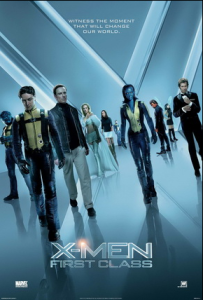 In The 40-Year-Old Critic, Venganza Media creator and host Arnie Carvalho recalls a memorable film for each year of his life. This series appears daily on the Venganza Media Gazette.
In The 40-Year-Old Critic, Venganza Media creator and host Arnie Carvalho recalls a memorable film for each year of his life. This series appears daily on the Venganza Media Gazette.
I didn’t really want to review the X-Men films for Now Playing Podcast.
Don’t get me wrong, I enjoy discussing any movie in-depth, whether it’s Leprechaun in Space or Touch of Evil. But for X-Men I had a specific hesitation.
I had, in passing, already discussed these films with longtime friend and podcast co-host Stuart. It was clear we didn’t see eye-to-eye; he expressed a preference for Bryan Singer’s earlier, dour X-films; I actually enjoyed Brett Ratner’s third X-Men movie, The Last Stand, the most — finally giving the superheroes fight sequences they’d been denied on screen.
I hadn’t seen the X-Men films in a few years by 2011, when we started our Marvel Movie Retrospective Series, but I was fully prepared to stand alone with my minority opinion.
It wasn’t that I loved X-Men: The Last Stand. I felt all the X-Men films were lacking in some areas, and expressing my preference for Ratner’s vision didn’t mean I could champion it. I loved Marvel, especially the movies, but to this franchise I held no allegiance.
That is why in 2009 we took a pass on that year’s X-Men Origins: Wolverine. After the film was released we felt doubly justified.
But, as I discussed in my Howard the Duck article, in 2011 Now Playing was beginning its most ambitious endeavor; reviewing every Marvel-based movie ever released in theaters (U.S. or overseas). That meant Stuart, Jakob, and I would have to tackle the X-films, eventually.
How we approached this retrospective was the subject of some debate. I initially pitched doing all the films intermixed, in chronological order. Perhaps because it would have seemed odd to have 2002’s Spider-Man review immediately followed by 2003’s Daredevil and Hulk (both released before Spider-Man 2) Stuart wisely suggested breaking the series into a number of smaller sub-series; do Spider-Man as a unit, Blade as another group, and the X-Men by themselves. But then how would we order them? First-to-last according to release date? Or do we start with the most recent film?
Finally, realizing the interest listeners had in our theatrical release reviews, we decided to just shuffle all the series’ around to whatever order fit; but two rules presided. First, we would arrange series’ so that if they had a theatrical release, as happened for X-Men and Ghost Rider, we would tie into that release. Second, we would do all the movies in time for the ultimate Marvel crossover movie: 2012’s The Avengers.
(Sony then threw a wrench in that plan by releasing their The Amazing Spider-Man reboot in the weeks following Avengers, making Marvel’s most popular superhero the only one we hadn’t reviewed)
This massive undertaking meant we could delay it no further; we had to review X-Men. More, while we had done three one-off Marvel movies — Howard the Duck, Man-Thing, and Kick Ass, in a loose group we called Marvel Misfits — X-Men was our first real series in the Marvel Movie Retrospective. This was demanded by the release of 20th Century Fox’s impending reboot/prequel of their X-franchise, X-Men: First Class.
I wasn’t terribly excited for First Class. It was the latest offering in a scattershot series. More, it didn’t have Wolverine. While his 2009 solo film was an over-the-top testosterone-fueled orgy of explosions, I still enjoyed the character and did wonder if his absence from First Class was a blessing, giving him a rest after Origins, or a curse, the new film lacking the series’ star.
It turns out all of this fear was for nothing. While Stuart and I did disagree over the merits of the first three X-Men films and Origins, the conversations were always fun. More, Jakob provided a great third perspective that tempered both of our points and prevented the conversations from following any preconceived pattern I’d feared. Also, revisiting the films with revised expectations allowed me to appreciate them more than I had in the past.
More importantly, though, in 2011 the X-Men got their first truly great film with First Class. I had feared not finding a film I loved in the X-series, but new director Matthew Vaughn delivered that in spades.
First, the film had a lead cast that was nothing short of amazing.
I knew James McAvoy from his earlier teen comedy Starter For Ten, a film funnier than its teen game show premise deserved. The actor was also a standout in Wanted, holding his own against Morgan Freeman and Angelina Jolie, and imbibing his character with personality that seemed lacking from the movie’s thin script.
Still, while I liked the man’s work, I had a hard time imagining him as Charles “Professor X” Xavier, the lead X-Man portrayed by Patrick Stewart in the earlier films. But with Vaughn’s direction and the script (co-written by the director) this was a young, cheeky Xavier, and McAvoy owned the part.
He was, however, overshadowed by co-star Michael Fassbender, who took the role of Erik “Magneto” Lensherr; previously occupied by Ian McKellen. X-Men: First Class took elements from a canceled X-Men Origins: Magneto script — and truthfully this film is Magneto’s. Like the original X-Men film, First Class opens in a Nazi concentration camp showing Magneto, still a child, discovering his powers. But it continues that story line and shows the Nazis grooming Lensherr and training him. Magneto’s quest for revenge is the true arc of this film, and, playing Erik as an adult, Fassbender commands the screen.
I can’t recall even hearing Fassbender’s name before First Class. I had seen him in only two films: 300 and Jonah Hex, and neither performance was memorable. From this role I knew Fassbender had amazing range. With the X-Men franchise under his belt Fassbender has picked a variety of mostly smaller films allowing him to demonstrate his range, but he was truly the best find of First Class.
That is probably a somewhat unpopular opinion, especially for any Hunger Games fans reading this review, as First Class also featured Jennifer Lawrence, starring as the shape-shifting mutant Mystique (a role previously played by Rebecca Romijn). Unlike Fassbender, I knew of Lawrence before First Class due to her role in Winter’s Bone. Strong word-of-mouth brought that movie to my attention, and Lawrence earned an Academy Award nomination for her role. Still, while already an acclaimed actress, she was just beginning her career. Few could have predicted what her future held; becoming Hollywood’s biggest actress thanks to her role of Katniss in the aforementioned Hunger Games series, plus continuing to make critically acclaimed films, as well as winning an Oscar for her role in Silver Linings Playbook.
In X-Men: First Class it was clear she was as talented as her more seasoned co-stars. While not much more than a sexy henchman in the original X-Men trilogy, here Mystique’s dilemma is the heart of the film; she can do amazing things but her true form is scaly and blue. The film shows her path of self-acceptance and, as a by-product, her allegiance shifting from the more diplomatic Professor X to the more militant Magneto.
Even the smaller roles were stacked with great performances, with Kevin Bacon, Rose Byrne, Nicholas Hoult, and Oliver Platt being stand-outs. I felt the only weak link in the film was January Jones, the Mad Men star who played “White Queen” Emma Frost.
Yet while the cast was amazing, its director was even more so. I knew Vaughn only for his 2010 superhero parody Kick-Ass, and he brought that same visual flare and fast-paced storytelling style to First Class. Also, like Kick-Ass, this film had actual character development intermixed with a healthy dose of comedy.
Out of all the X-Men films, this was the first one that had been really, truly fun while also establishing amazing rivalries and human drama. It was the first great X-Men movie.
It was a delight to watch, and I was ecstatic while recording the Now Playing review when I discovered Jakob and Stuart had seen the same film I did. The only thing better than watching an amazing film is sharing that enthusiasm with other film lovers.
The movie, and that podcast review, were my personal high points of our X-Men retrospective series, and it kicked off our Marvel Retrospective with a huge bang. There were good times ahead.
In the three years since this film’s theatrical release I’ve seen it at least a dozen more times. I went back to see it in theaters even after Now Playing’s review, just for fun. I bought it on its Blu-ray release date, and watched it immediately. It’s a staple, any time it airs on television I turn it on again. On flights it’s the movie that gets the most play on my iPad.
Yet this enthusiasm is tinged with sadness. While I did not share a dissenting opinion on the podcast, all three of us seem to be in a minority group for our love of this film. It became the lowest grossing X-Men film ever — audiences just didn’t turn out to see the movie. Perhaps they were put off by the lack of Wolverine? Maybe the 1960s period piece feel didn’t appeal to 21st Century moviegoers? Perhaps the summer was just too full of superheroes with Thor and Captain America also hitting screens? No matter the reason, the film failed to find an audience and made less money than 2000’s original X-Men, even with 11 years of ticket inflation taken into account.
More, it seems this movie didn’t catch on in home video. I thought it could have a second life in home theaters, but my anecdotal evidence suggests people simply preferred the movies with the original cast to this new vision.
If there is no greater joy than discussing a beloved film with others who share that sentiment, there are few feelings more depressing than feeling alone and wondering why everyone else can’t see in this film the great things I see.
Worse, lack of fan response ended First Class‘ run in the X-Men. Fox, knowing they have to battle Marvel (who are the creators of the X-Men characters, but don’t hold the film rights), decided a major course correction was needed for the studio’s premier superhero franchise. They had definite ideas for the next X-Men movie, and were prepared to spend more than they ever had before to ensure their mutants could stand their ground against the Avengers. Studio interference and demands, including bringing back some members of the original cast to appeal to fans, led to Vaughn abandoning development on the sequel film, and in his place Bryan Singer returned to the franchise.
The result of Fox and Singer’s work was this year’s X-Men: Days of Future Past. It was a very good movie — Singer’s best entry in the franchise by a mile. Yet it didn’t do as good a job juggling the characters, the story line wasn’t as tight, and it lacked the groovy, kinetic fun of First Class. It lacked Vaughn, who was the X-factor the franchise needed most.
But again I may stand alone in that opinion, as Days of Future Past became the highest-grossing X-film to date; besting X-Men: The Last Stand’s take in 2006.
I have no doubt that with the upcoming X-Men: Age of Apocalypse, the X-films will continue to get grander and mix in more cast members new and old. I just hold out hope that at some point they look back and see all that First Class did right, and bring some of that lighthearted humanity back to the X-Men.
Tomorrow — 2011!
Arnie is a movie critic for Now Playing Podcast, a book reviewer for the Books & Nachos podcast, and co-host of the collecting podcasts Star Wars Action News and Marvelicious Toys. You can follow him on Twitter @thearniec
September 10, 2014 Posted by Arnie C | 40-Year-Old Critic, Comic Books, Movies, Reviews | 2010s, 40-Year-Old Critic, Avengers, Comic Books, Comics, Enertainment, Hasbro, Jennifer Lawrence, Marvel, Marvel Comics, Marvelicious Toys, Matthew Vaughn, Movie, Movies, Now Playing, Podcasts, Review, Reviews, Spider-Man, X-Men, X-Men First Class | 3 Comments
The 40 Year-Old-Critic: Scott Pilgrim vs. the World (2010)
In The 40-Year-Old Critic, Venganza Media creator and host Arnie Carvalho recalls a memorable film for each year of his life. This series appears daily on the Venganza Media Gazette.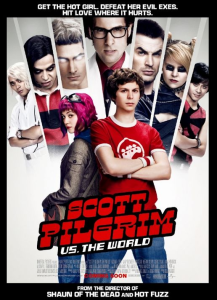
On the surface this may look like I’m again revisiting a movie reviewed on Now Playing Podcast. But that’s not the case. This is actually the first time I’m getting to share my views on Edgar Wright’s 2010 romantic comedy Scott Pilgrim vs. the World.
Looking back, I recall 2010 was a very busy summer for me. I was approaching my 5th anniversary of podcasting with Star Wars Action News, which was, at the time, our most-downloaded show. However, Now Playing was on the rise in the iTunes ranks, and while 2009 saw the show go several weeks without a new episode, by 2010 we were putting out a new show almost every week. We even decided to experiment with fundraising to help cover our costs by doing two shows a week in October: The Texas Chainsaw Massacre Retrospective Series on our main feed and the Child’s Play Retrospective Series for those who donated money to the show.
Doing so many podcasts at once was becoming a heavy load for me to carry, and I hit a bit of a breaking point by late summer. Not only were we doing two Now Playing shows per week and Star Wars Action News, but we also were covering San Diego Comic-Con in July (which had us producing an SDCC-exclusive bonus podcast review of I Know Who Killed Me), and the Star Wars Celebration V convention in mid-August. There Marjorie and I, as part of Star Wars Action News, were throwing a party that was to be attended by hundreds of people, hosting several panels on Star Wars Collecting and the Star Wars Radio Dramas, and, of course, trying to put together our reports on the convention.
I felt I needed a break; priorities had to shift. SWAN was Venganza Media’s flagship podcast, so it and Star Wars Celebration V demanded my attention. I needed time off from Now Playing.
Until that point I had been Now Playing’s constant. I was the producer and — for most of the run — editor of the show. The other hosts rotated, but I was always there facilitating the show and making sure it went smoothly. Yet I still made plans, communicating with Brock, Stuart, and Jakob to do the Philip K. Dick Retrospective Series without me. It seemed perfectly timed, as The Adjustment Bureau was coming out in July. The guys would record the shows, and our first editor, Jay, would cut them. I could finally be “hands off.”
It wasn’t that I didn’t want to be on the series; Blade Runner is a long-time favorite that I’ve seen more often than I can count. Total Recall is another favorite. With Minority Report also in the series, I would have liked to be there to express the minority opinion that the film isn’t very good.
Still working the schedule, I could see we needed one more show for August, specifically for the weekend of Star Wars Celebration. I suggested the guys do Scott Pilgrim vs. the World. I knew nothing about the movie beyond having seen some trailers, but to me it seemed in line with Now Playing’s usual fare. First, it looked like a film full of comedic action and special effects. Second, it was coming from Edgar Wright, the director of the awesome and quirky Shaun of the Dead and Hot Fuzz. Third, Jakob was a huge fan of the comic books and hyped for the film.
It seemed all set and ready to go.
Then it all fell apart.
Right after the July 4 weekend Universal Pictures announced it was moving The Adjustment Bureau’s release to February 2011. These Hollywood schedule shifts always cause headaches for us, but none had been worse than this one; most of the Dick series had already been recorded and we had to scramble to get other shows ready and released to fill that gap — not what I wanted to be doing in an already jam-packed July.
Then came Scott Pilgrim vs. the World. I was in Orlando for Celebration when the show was released, which made it the first (and only) time in Now Playing history I was hearing the show as a listener. I had complete faith in the guys to do a great job, but it was odd to be so out of the loop on my own show. Yet I listened, even without having seen the film, and it was a solid episode. Still, it was hard for me to judge — I was too busy to see the movie.
Finally, after returning from Celebration in late August, Marjorie and I made it to the theater to see Scott Pilgrim. It was a chore — the movie had quickly vanished from our local theaters, so we had to drive two hours each way to see it. Yet it was completely worth it. I sat there enraptured as Wright delivered what, to this day, remains his best film.
Part of the thrill came from the fact I didn’t really know what the film was about. The trailers suggested that the characters were living in a video game world, collecting coins and getting 1-Up extra lives. It was quirky, but what was it about? I expected the movie to offer some explanation; perhaps, Tron-like, Scott had fallen into a video game world, or maybe he had an overactive imagination like The Secret Life of Walter Mitty?
No, it turned out Wright was a confident enough filmmaker to just make a fantasy film in which this was the world. It wasn’t strange to any character that mortal combat would break out in the streets, that two-headed dragons would emerge from speaker systems, or that coins magically appear when people die. All taking place in the magical land of… Canada. It was a vision that Wright completely committed to, and the result is a phenomenally immersive experience. I usually don’t like fantastical scenarios (going to Tolkien’s Middle Earth holds little appeal) but I would love to visit Wright’s Canada.
The editing and music on the film were honestly the best I’d seen in a film that year. Wright’s kinetic montage-style of filmmaking had been a high point of his previous two movies, but here was the first time he seemed totally at ease with his own storytelling ability. It was the same effective, short-hand repetition Darren Aronofsky had used in Requiem for a Dream, but here it was fun and it worked. More, it hit me in a sweet spot: its video game references were all of the late 80s and early 90s 8-bit and 16-bit systems like Super Mario Bros., games I spent thousands of hours playing in my youth.
The film’s saturated color palette, the comic book-style words that filled the frame, the soundtrack and score, every element came together in Scott Pilgrim to create an incredibly fun movie experience.
But there was more to this movie than just a good time — it was also a romantic comedy. The primary plot surrounds Scott Pilgrim (Michael Cera), his crush on Ramona Flowers (Mary Elizabeth Winstead) and their courtship. In order for them to date, though, Scott had to engage Ramona’s “Seven Evil Exes” in battle.
The trailers told me that was the setup for the film, but the focus had been on the fights and the comedy. I had no idea that the movie would be so deep on the romance.
The film is virtually a love quadrangle: Scott starts the film dating underage Knives Chau (Ellen Wong), a girl so infatuated with him that she practically seems like a groupie for Scott’s band, Sex Bob-omb. Scott is a very passive character so he can’t bring himself to break up with Knives until he is certain things are going well with Ramona.
Then, in the background, is Sex Bob-omb drummer Kim Pine (Alison Pill), Scott’s ex-girlfriend who seems fed-up with her bandmate’s immature relationships.
This wasn’t your standard rom-com where everything is clean-cut and neat — there were messy relationships at work. In this magical land of Canada real emotions and moral dilemmas were being had. Were Scott’s actions right, or was he wrong for dating Ramona while still going with Knives? Did I want to see Scott with Ramona?
Yes, Scott was infatuated with Ramona; she was the princess in the castle and Scott was the video-game hero who had to rescue her. He didn’t just have to court her; he had to fight for her. Literally. Ramona has had seven romances in her life and Scott must defeat each one.
First, this is an awesomely delivered metaphor for any new romantic relationship. When two adults start to date each brings with them the wounds of heartbreak and the baggage of previous boyfriends and girlfriends. New love often is accompanied by hesitation and a degree of paranoia; will this person try to control me like my last girlfriend did? Will he cheat on me like my previous boyfriend?
In real life those “evil exes” are simply previous loves lost, and a new suitor must battle it by earning trust and proving themselves better than those who came before. But that’s the real world; in Wright’s fantasy-land of Canada these evil exes have to be fought Mortal Kombat-style… to the death. It’s a storytelling conceit that is fun but also drives home that Ramona carries some serious baggage.
Wright has perfect casting in the film, with Cera a particular highlight. I first encountered the actor in Superbad and then caught up on his breakthrough television role of George Michael Bluth on Arrested Development. He carries with him a shy niceness that makes him seem sweet even when making bad decisions. More, he’s thin and wiry, and doesn’t look well-equipped to engage anyone in combat. When Matthew Patel, the first evil ex, appears, it’s easy to think Scott’s ass will be handily kicked.
Yet this is Canada, normal rules of fighting don’t apply. Scott pulls out fighting moves that astound Patel and the audience. While Patel and Scott fight in hand-to-hand combat, no two battles follow the same video game convention. From Rock Band to Tony Hawk Pro Skater, each fight has its own video game analog.
But as Scott battled I started to wonder if he and Ramona really should be together. Ramona was non-committal; she couldn’t even go a few days without changing her hair color, let alone her boyfriend. Even as Scott battles ex after ex, Ramona is not forthcoming about her past — Scott’s every day is a surprise of what’s coming next. More, as each ex arrives Ramona finally reveals to Scott her relationship with that person, and how she broke up with them. It turns out Ramona was always the one to initiate the break-up, she’d never been dumped.
Scott was fighting for Ramona, but I wondered if Ramona would fight equally for Scott. Winstead’s performance is wonderfully reserved, giving me that hesitation. We know Knives would, and does, fight for Scott’s love, but is Ramona the one Scott should end up with? Or will she dump him as she has all seven of her exes?
More, it turned out Scott himself had a history, having been dumped by Natalie “Envy” Adams (Brie Larson) when she became famous with her band The Clash at Demonhead. Scott is as evasive about Envy as Ramona is about any of her exes.
For a movie that was sold as an 8-bit video game fight, I was just as enthralled with the emotional resonance and depth of characterization occurring on-screen.
The actors, from large roles to small, also delivered great performances. Kieran Culkin almost stole the film as Scott’s gay roommate Wallace Wells. Every scene with Culkin is full of quotable dialogue and unexpected humor. Minor roles in the film are stocked with familiar faces, including Rushmore’s Jason Schwartzman as seventh evil ex Gideon Gordon Graves, Brandon Routh (Superman Returns) as a psychic vegan Scott must fight, and Captain America Chris Evans as a skateboarding action movie star. The latter two had both done superhero films I disliked (Routh in Superman, Evans in Fantastic Four), but their performances here won me over and I left the film actually liking both of them. Plus cameos by Thomas Jane (The Punisher) and others always had me going, “I can’t believe he’s in this film too!”
I don’t wish to sound trite, but everyone in this movie was perfect — and that’s a term I don’t use lightly.
That this film didn’t find its audience at the box-office was disappointing. This was a movie I thought everyone should see, and most would enjoy. It had come out of nowhere and became my favorite film of 2010 (with Kick-Ass a very close second).
More, though, I was heartbroken. This was such a great movie and I couldn’t talk about it. That spot on the show had been given up, through my own action. I had said, “You guys go ahead, take this one without me.” Now I can never spend two hours debating the various romantic entanglements, and relishing in the great performances delivered in Scott Pilgrim. Despite putting more than 2,000 words of praise into this article, it will never be as widely disseminated a review as the one you’ll hear on Now Playing Podcast.
I have very few regrets in my podcasting history. Not being on the panel reviewing Scott Pilgrim vs. the World is one of the biggest.
That day I made a vow — I wouldn’t make that mistake again. After Scott Pilgrim there would never again be a Now Playing review I did not co-host. Barring massive illness or injury, I will remain Now Playing’s constant. It is in my blood to discuss film. I love the conversations, even if I don’t always love the film.
Another host approached me when Jakob, Stuart, and I were doing our Steven Spielberg donation retrospective series covering Close Encounters of the Third Kind, E.T., and War of the Worlds, asking for a turn on the panel. His argument was, “You don’t even like Close Encounters,” so why would I want to be on the review. The answer was pure and simple — I wanted to be there to say why I didn’t like Close Encounters. I wanted to have that debate with two fans of the film. It’s not just about the movie; it’s about the analysis, the debate, and the conversation. There’s no fun if everyone agrees on everything, having a minority opinion is vital to good debate.
I will always regret not being able to be on a podcast review of Scott Pilgrim vs. the World, but I came out of that knowing how important Now Playing truly is to me. And that is a happy ending.
Tomorrow — 2010!
Arnie is a movie critic for Now Playing Podcast, a book reviewer for the Books & Nachos podcast, and co-host of the collecting podcasts Star Wars Action News and Marvelicious Toys. You can follow him on Twitter @thearniec
September 9, 2014 Posted by Arnie C | 40-Year-Old Critic, Comic Books, Movies, Reviews | 2010s, Comic Books, Comics, Edgar Wright, Enertainment, Film, Michael Cera, Movie, Movies, Now Playing, Now Playing Podcast, Podcasts, Review, Reviews, Scott Pilgrim, Star Wars Celebration | 1 Comment
-
Archives
- February 2021 (1)
- January 2021 (1)
- December 2020 (1)
- November 2020 (3)
- October 2020 (2)
- September 2020 (1)
- August 2020 (2)
- July 2020 (1)
- June 2020 (1)
- May 2020 (1)
- April 2020 (3)
- March 2020 (2)
-
Categories
-
RSS
Entries RSS
Comments RSS
Site info
Venganza Media GazetteTheme: Andreas04 by Andreas Viklund. Get a free blog at WordPress.com.
